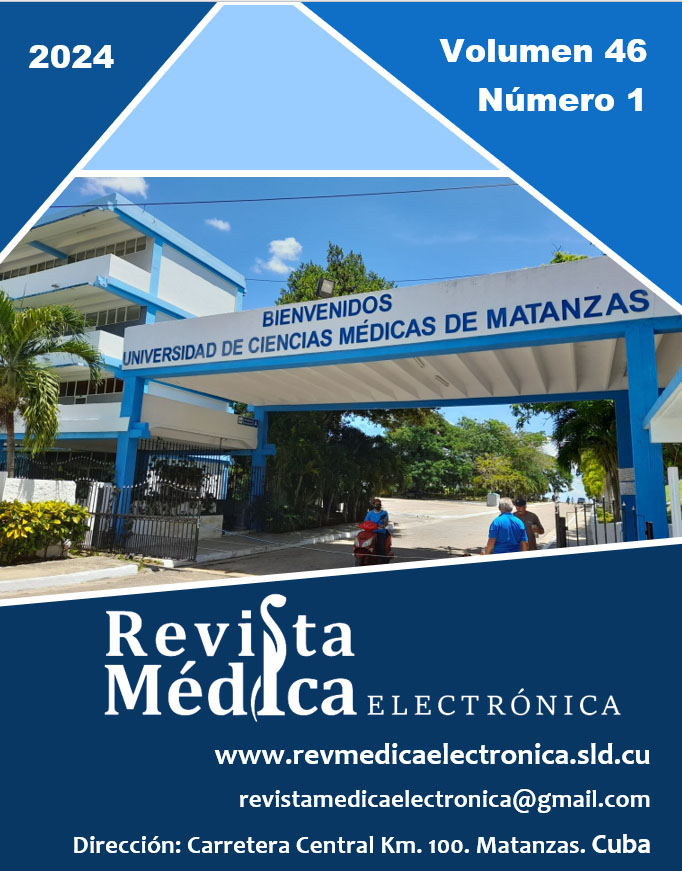Training and development of the values responsibility, humanism and honesty in medical students
Keywords:
values, responsibility, humanism, honesty, medical studentsAbstract
Introduction: The comprehensive training of Medicine students implies the search for effective ways in educational work, where critical thinking is required of them, to achieve an autonomous attitude in the acquisition of new knowledge, professional skills, ethics, formation and development of values, from the organizational forms of teaching, research, and university extension (substantive processes of the university), which are expressed in behaviors in accordance with socialist humanism.
Objective: To identify values in first-year medical students.
Methods: A descriptive, cross-sectional research was carried out to identify values in first-year medical students, enrolled in the 2016-2017 academic year, of the Faculty of Medical Sciences of Matanzas Dr Juan Guiteras y Gener, in the period 2016-2020, the study universe being made up by 628 students. The modes of performance of values were operationalized for first-year medical students. The variables values and activity system were studied, using empirical and statistical methods.
Results: the students express having values, but they do not totally correspond to the modes of action declared in the Director Program for Education in the Value System of the Cuban Revolution and operationalized for students.
Conclusions: the value responsibility has insufficiencies, which was evident in the attitude towards the study, since the answers to the control questions and in seminars are not satisfactory, as well as in the incorrect use of the uniform. In the delivery of task, the lack of honesty is corroborated since there are textually similar and/or equal works. Related to humanism, there are manifestations of not feeling the problems of others as their own.
Downloads
References
2. Comisión Nacional de la Carrera de Medicina. Plan de estudio E Carrera de Medicina. La Habana: Universidad de Ciencias Médicas de la Habana; 2019.
3. Alfonso Salabert I, Afonso de León JA, Tortoló Fernández SF. El desarrollo del valor humanismo en los residentes de la Especialidad de Medicina Intensiva y Emergencia [tesis]. Matanzas: Universidad de Matanzas; 2022.
4. Cantú Martínez PC. Profesorado universitario: emisor de valores éticos y morales en México. Rev Educación [Internet]. 2018 [citado 01/10/2022];42(1):105-17. Disponible en: https://www.redalyc.org/journal/440/44051918009/44051918009.pdf
5. Hernández Prados MÁ, Vidal Dimas N. Los valores y el comportamiento humano. Una relación inevitable. Dilemas Contemporáneos: Educación, Política y Valores [Internet]. 2020 [citado 01/07/2023];7(2). Disponible en: https://dilemascontemporaneoseducacionpoliticayvalores.com/index.php/dilemas/article/view/1992/2050
6. Charro Pérez AA, Ramírez Ravelo AM, Martín Garateix M. Labor educativa en las universidades para el desarrollo de valores sostenibles en nuestra sociedad. Varona [Internet]. 2018 [citado 01/07/2023];(66). Disponible en: https://www.redalyc.org/articulo.oa?id=360671884011
7. Fresno Chávez C. La formación de valores: reto del siglo XXI [Internet]. La Habana: Editorial Universitaria; 2020 [citado 09/07/2023]. Disponible en: http://recursosuvs.sld.cu/index.php?P=FullRecord&ID=606
8. Moreno Jácome MC, Ramírez Ramírez LN, Escobar Pérez JZ. Revisión de educación en valores para el nivel superior en Latinoamérica. Rev Educación [Internet]. 2020 [citado 01/07/2023];44(1). Disponible en: https://www.redalyc.org/journal/440/44060092008/44060092008.pdf
9. Torriente Mesa NL. Estrategia curricular “desarrollo del valor humanismo” en la formación médica. Experiencias de la comunidad educativa. Matanzas: Editorial REDIPE; 2020.
10. Padrón Álvarez A, Cardet Chaveco Y, Oropesa Gómez Y. La formación de valores en la universidad ¿utopía, posibilidad o necesidad? Ref Pedagógica [Internet]. 2021 [citado 21/08/2023];9(2):175-91. Disponible en: https://rrp.cujae.edu.cu/index.php/rrp/article/view/246
11. Salas Perea RS, Salas Mainegra. Modelo Formativo del Médico Cubano. Bases teóricas y metodológicas. La Habana: Editorial Ciencias Médicas; 2017.
12. Dicado Alban MA, Cumandá Fanny CC, Saa Morales AS. Los valores humanos y su incidencia en la calidad del estudiante universitario. Opuntia Brava [Internet]. 2019 [citado 05/09/2023];11(3):247-55. Disponible en: https://opuntiabrava.ult.edu.cu/index.php/opuntiabrava/article/view/809
13. Naipe Delgado MC, Castañeda Piñera Y, Salabert Tortoló I, et al. El fortalecimiento de valores en tiempos de la COVID-19 en la Universidad de Ciencias Médicas. En: Escuela Latinoamericana de Medicina. Educación y Pedagogía. “La educación médica en Matanzas: dinámica de la relación universidad – sociedad” [Internet]. New York: Editorial REDIPE; 2020 [citado 05/09/2023]. Disponible en: https://redipe.org/wp-content/uploads/2021/03/cidep-2020-2-parte-v.pdf
14. Reyes Alamilla OI, Hernández Romero G. Identificación y práctica de valores en la formación universitaria. Rev Cubana Educ Super [Internet]. 2019 [citado 05/09/2023];38(2). Disponible en: http://scielo.sld.cu/scielo.php?script=sci_arttext&pid=S0257-43142019000200017&lng=es&tlng=es
15. Comité Central del Partido Comunista de Cuba. Comisión del Buró Político. Programa Director para la Educación en el Sistema de Valores de la Revolución Cubana. La Habana: Comité Central del Partido Comunista de Cuba; 2012.
16. Comité Central del Partido Comunista de Cuba. Conceptualización del modelo económico y social cubano del desarrollo socialista. Lineamientos de la política económica y social del Partido y la Revolución para el período 2021-2026 [Internet]. La Habana: Comité Central del Partido Comunista de Cuba; 2021 [citado 05/09/2023]. Disponible en: https://www.mined.gob.cu/wp-content/uploads/2021/09/CONCEPTUALIZACION-DEL-MODELO-ECONOMICO-Y-SOCIAL-CUBANO-DE-DESARROLLO-SOCIALISTA-y-LINEAMIENTOS-DE-LA-POLITICA-ECONOMICA-Y-SOCIAL-DEL-PARTIDO-Y-LA-REVOLUCION-PARA-EL-PERIODO-2021.pdf
Downloads
Published
How to Cite
Issue
Section
License
All content published in this journal is Open Access, distributed under the terms of the CC BY-NC 4.0 License.
It allows:
- Copy and redistribute published material in any medium or format.
- Adapt the content.
This will be done under the following terms:
- Attribute the authors' credits and indicate whether changes were made, in which case it must be in a reasonable way.
- Non-commercial use.
- Recognize the journal where it is published.
The copyrights of each article are maintained, without restrictions.






